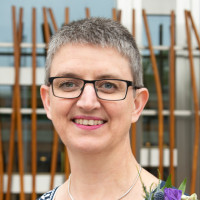David MacLennan: a cultural legacy

This evening I had the huge honour of introducing and presenting a portrait of the late David MacLennan to his widow, Juliet Cadzow. Oran Mor hosted this event, and the painting, commissioned by Democratic Left Scotland and painted by Sandy Moffat, will have a home there for the foreseeable future. Here is a copy of the portrait, and the text of my speech.
Good evening everyone. Thank you to Dave (Anderson) for that introduction.
It is a huge honour to be here this evening, speaking on behalf of Democratic Left Scotland, at this unveiling and presentation of Sandy Moffat’s portrait of David MacLennan.
Democratic Left Scotland is an organisation that seeks to provide a space for discussion about a new kind of politics, a progressive and inclusive politics that presents an alternative to global capitalism. We seek, as an organisation, to transcend party lines, and work for progressive social change through activity in civil society – in community groups, social movements and campaigns. Our approach to politics has three strands: it is radical, feminist and green, and we try to promote discussion and alliances across lines of party, position and identity.
One aspect of our work has been to highlight and promote the value of Scottish culture and the arts as an integral part of human existence. And we are delighted to recognise David MacLennan’s contribution to the cultural life of Scotland. We commissioned Sandy Moffat’s painting to add to those of Alasdair Gray, Alan Bissett and Tom Nairn, all of whom have made very substantial contributions to the Scotland we see today.
It felt to me that the appropriate thing to do on an evening like this was to read from the great cultural theorist Raymond Williams who said:
“Culture is ordinary: that is the first fact. Every human society has its own shape, its own purposes, its own meanings. Every human society expresses these, in institutions, and in arts and learning. The making of a society is the finding of common meanings and directions, and its growth is an active debate and amendment under the pressures of experience, contact, and discovery, writing themselves into the land. The growing society is there, yet it is also made and remade in every individual mind. The making of a mind is, first, the slow learning of shapes, purposes, and meanings, so that work, observation and communication are possible.
“Then, second, but equal in importance, is the testing of these in experience, the making of new observations, comparisons, and meanings. A culture has two aspects: the known meanings and directions, which its members are trained to; the new observations and meanings, which are offered and tested.
“These are the ordinary processes of human societies and human minds, and we see through them the nature of a culture: that it is always both traditional and creative; that it is both the most ordinary common meanings and the finest individual meanings.
“We use the word culture in these two senses: to mean a whole way of life – the common meanings; to mean the arts and learning – the special processes of discovery and creative effort. Some writers reserve the word for one or other of these senses; I insist on both, and on the significance of their conjunction. These questions are questions about deep personal meanings. Culture is ordinary, in every society and in every mind.”
Raymond Williams’ words were reflected nowhere better than in the life, work and art of David MacLennan. Deep personal meanings, the processes of discord and creative effort. The new observations and meanings. And in that, the finding of common meanings. Culture: our paintings and our plays produce the broader culture of our society. So David’s work is as vital to the political history and life of our country as any parliamentarian or prominent activist.
David’s early career with 7:84 and Wildcat brought political theatre to contemporary Scotland. “The Cheviot, the Stag and the Black, Black Oil” transformed people’s understanding of Scotland’s history, particularly that of the politics of the Highland Clearances.
And “A Play, a Pie and a Pint” continues to bring theatre to new audiences in a remarkably egalitarian way – in Glasgow and around the world. We celebrate great cultural figures like David MacLennan in this way to acknowledge the role of artists in reflecting upon, critiquing and recreating our society.
For us in Democratic Left Scotland the work of 7:84 and Wildcat are key examples of our belief that culture and politics are where human society expresses our beliefs, where our purposes and meanings are formed.
We need to remake that society. And that is what the best art does. The art, and culture, that we celebrate here this evening.
I would like to invite Juliet, David’s widow, to join me and unveil this magnificent painting that I hope will serve as a celebration of his life.
Thank you.
